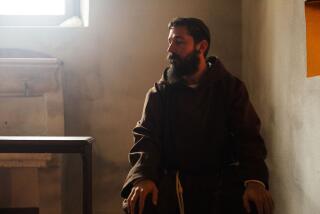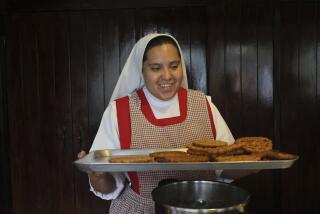More Older Men Trading Careers for Cassocks : Camarillo: St. John’s Seminary mirrors a rise nationwide in the ages of aspiring Catholic priests.
- Share via
It was the stuff of a midlife crisis.
After a series of shallow television parts and reckless stunt jobs, actor Bob Lussier found himself in a role that made him question the meaning of life.
He played an inventor who created an inflatable bra on a television sitcom.
“There’s a point in each person’s life when the emptiness hits them,” said Lussier, 58, who was ordained as a priest Saturday after studying at St. John’s Seminary in Camarillo.
“This show was something being done in prime time while the kids were still up. It had no sense of worth at all,” said the former actor, whose credits include roles on “That Girl,” “The Love Boat,” “Bonanza” and “Three’s Company.”
Six years ago, Lussier left show business, sold a $365,000 Hollywood home and became a monk before going to the seminary to study for the priesthood. He is part of a national trend of older men--including bankers, attorneys, accountants and engineers--who say their lifelong pursuit of money and status has left them cold.
And they are finding the Roman Catholic Church receptive.
Over the past decade, the numbers of young men interested in the priesthood have plummeted, while there has been an increase in U. S. Catholics due to immigration, said Jeremiah McCarthy, vice rector and academic dean at the seminary.
These trends, combined with the liberalizing effect of the second Vatican Council, have created a climate more welcoming to older men, McCarthy said.
The most recent national study of post-college Catholic seminarians found that only 36% were 25 years old or younger. In 1966, the figure was 72%. And at least a third of seminarians today are more than 30, compared with 7% in 1966.
At St. John’s, where seminarians attend for four years and are trained for service in the Archdiocese of Los Angeles, those trends hold firm. In a student body of 138, the average age of a seminarian is 32 this year, compared with 29 five years ago, McCarthy said.
Tuition, room and board cost $6,400 a year at the seminary, which is surrounded by orange and lemon groves. While several of the older seminarians have offered to pay their way, most are sponsored by a religious order or a bishop, McCarthy said.
But is it worthwhile to train older men, who may not be able to give the church as many years of service?
“I think it’s always cost-effective when you invest in people,” McCarthy said. “We believe in the gifts and contributions people can make at all ages.”
At St. John’s, seminarians take vows of obedience and celibacy but not poverty. They are not required to get rid of their wealth, but they are encouraged to adopt a simple lifestyle.
Making that change is not always easy.
In September, admission director Mark Fischer started the Older Seminarians Group. Students from 30 to 70 meet once a week to discuss their difficulty adjusting to the seminary and their choice to leave jobs, lifestyles and, in some cases, sexual relationships with women.
Most of the older seminarians, who meet every Thursday afternoon, say they always thought of becoming a priest. Most never married, although many had girlfriends. The few who have been married are either widowers or divorced men who had their marriages annulled--a church procedure by which a marriage is deemed invalid. Still, there sometimes are children and grandchildren to consider before becoming a priest, McCarthy said.
“We want to make sure they have the same kind of flexibility as younger students,” he said.
Jim Carden, 58, was a school and college teacher in Bakersfield for 32 years when he started thinking about the priesthood as an alternative to retirement.
“I couldn’t retire to washing the car or playing golf,” Carden said. “It’s exciting to have something to retire to instead of retiring from. The most difficult thing is believing I can do this at my age.”
Finishing his first semester, Carden said he was going through a “grieving process” over his past life. “I’m not talking about just material things. I was in charge of a department and employees,” he said.
The absence of women at the seminary is also difficult, he said. “One of the things that bothers me is that it’s all male. I miss the female companionship,” said Carden, who never married.
Bob Biroschak, 53, a former partner in a corporate law firm in Los Angeles, said he had always wanted to be a priest as a child but waited until he was 50 before entering the seminary.
The hardest thing is to “maintain maturity and integrity” among younger men, he said.
“You can’t regress,” said Biroschak, who hopes to be ordained in June. “You have to be yourself. But it’s hard going from being the evaluator to being evaluated. You go from planning your own day to having your day mapped out.”
As for celibacy, Biroschak said he is unsure whether it is harder for older men than their younger colleagues.
“For younger men, there may be a view of being a celibate as being on a diet. It may be easier as a concept for them,” said Biroschak, a lifelong bachelor. “But facing the fact that you won’t have a wife, children or grandchildren can be harder for older people. For us, it’s not just an idea.”
The men said they find solace and support in the Older Seminarians Group, but they also use the sessions to work out day-to-day problems. Noise in the dormitory is the latest hot topic, Fischer said.
“I go to bed early to get up early to pray,” said Larry Neumeier, 44, a former newspaper reporter and editor, who says the noise sometimes bothers him. “But I tell myself this is a temporary situation. I’m only going to be here a few years.”
Fischer said the older seminarians will change the church, even though “they will never be as powerful as the lifers”--those who enter the priesthood as young men.
“But as people who have had to pay a mortgage and punch a clock, they can sympathize with those who face the same troubles,” Fischer said.
In fact, several men said that after they arrive at their parishes, they plan to bring religion to the professions they left.
Biroschak said he would like to start a support group for lawyers and investment counselors. “I know what it’s like to stay up to work on a deal. I understand the pressures of deals going through,” he said.
And Lussier wants to start a monthly service in Hollywood for actors, actresses, producers and directors.
“If you’re seeking faith, the moral choices are difficult in the business. And when they are connected to your livelihood, it can be a choice between being morally clean or eating.
“I’ve come to realize there are two worlds. You have to live in the world but not be of it,” he said.
More to Read
Sign up for Essential California
The most important California stories and recommendations in your inbox every morning.
You may occasionally receive promotional content from the Los Angeles Times.













